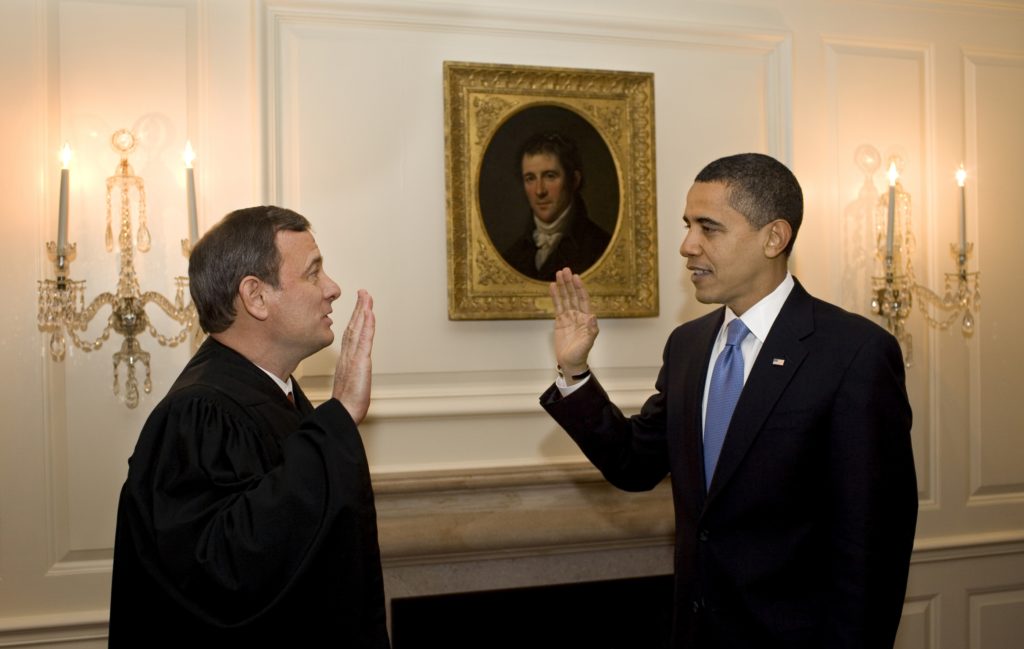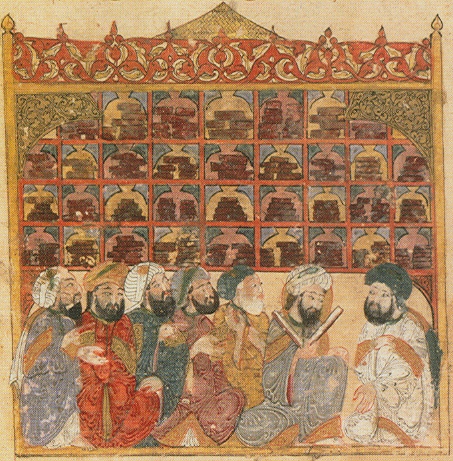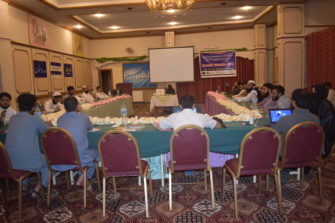
When president Obama took the oath to office, he unintentionally uttered a couple of the words in the wrong order. Although the meaning of the oath did not change, sticklers wondered whether the oath was legitimate and if Obama was really president. Doubts like this can linger and spiral out of control into conspiracies. So the matter was corrected in a privately conducted do-over ceremony the very next day. The authority of the Constitution was paramount, and every letter mattered. Rituals are tricky business in any culture, and Islam is no exception. Should the prayer be repeated if the person praying wasn’t facing Mecca? Is lab-grown meat halal to eat? Is that financial transaction valid? Can women serve as Imams of mixed-gender congregations? Who gets to decide?
The Sharia is complex, and that complexity has bred authority to help resolve, mediate, and manage it. A class of jurist-scholars (sg: ʿālim; pl: ʿulamāʾ) emerged to claim the authority of interpreting God’s will in Islamic civilizations. Ulama were authorized within communities of learning and knowledge transmission. They legitimized rulers as valid if they regulated affairs according to the Sharia. Rulers in turn authorized ulama by employing them to administer law and dispense justice. This structure of authority has been in crisis since colonialism and the rise of nation states.
The displacement of traditional authority has been traumatizing for Muslim societies, and the ʿulamāʾ have reacted in diverse ways. One response has come to be labeled Islamism: the wholesale attempt to take control of state authority and institutions. Another response manifests in retrenchment: reflexive cultural criticism of anything new and unfamiliar from behind the walls of the madrasa or from the elevation of the pulpit. Between these extremes are alternatives that seek either new forms of alignment between state institutions and traditional scholars (accommodation) or new paradigms of knowledge and authority (reconstruction).

The temptation to simplify might lead the analyst to see clear distinctions between these camps. But this temptation must be resisted, since the lines between retrenchment, accommodation, and reconstruction are in fact blurred. A single person may be accommodation-dominant, while exhibiting tendencies of retrenchment here, reconstruction there. And what believer in the Sharia is not an Islamist in some sense? After all, are the laws of God not designed for the common good? Should not divine wisdom have at least some relevance to public policy? The crisis of traditional authority is one of interpretation; it is not a difference of opinion on the imperative to submit to God’s will.
God’s will in the world is related both to private and public matters. The Sharia regulates not only prayer and charity, but also crime and punishment. And since the debates concerning interpretation have a direct bearing on policy and legislation, the issue of religious authority is inextricably linked to the concerns of those who wield political power. Muslim majority societies—whether they are despotic or democratic, Sunni or Shiite—and Muslims living as minorities all over the world have found their own ways to balance competing interests in the wake of modern dislocations. The space is wide open for creativity, whether genius or absurd.
An example of the latter is a notorious fatwa (legal opinion) emanating from a scholar of the famed Azhar University to deal with the problem of mixed-gendered workplaces. According to classical Islamic law, breastfeeding creates bonds of consanguinity and maternity. Drawing on this example, argued the scholar, men who drink from the milk of their coworkers would no longer have to observe the strictures of segregation in the workplace, becoming, as it were, a kind of household. In fairness, the opinion was retracted after severe criticism from within the very scholarly guild that authorized the scholar who issued the fatwa. But the damage was done. As Khaled Abou El Fadl points out, “One would be tempted to ignore this fatwa as a gross aberration or outlier if it were not part of a trend in contemporary Islamic discourse” (47).
This kind of “Milk Shaykh,” as I jokingly referred to him once, elicits laughter and derision in the classroom. But the point is a serious one: the erroneous Azhar scholar was attempting to respond to a particular crisis using classical modes of thought. In this case, the attempt was patently absurd and rightfully dismissed by his own traditional colleagues. Other attempts can be more sophisticated, but in their sophistication only serve to mask underlying problems that are structural in nature: in many instances, the methodology used to derive legal rulings no longer yields acceptable or intelligible outcomes.

Academic institutions, particularly in North America and Europe, are beginning to provide a counterweight to madrasa scholars who wield authority in the name of the classical tradition. In bringing the tools of higher criticism to bear on Islamic history, academic scholars argue that traditional scholars do not notice the way that their supposedly objective interpretations of scripture reveal their subjective biases. According to contemporary convention, there is no such thing as objective knowledge. Knowledge is perspectival, history is contingent, and religious thought merely reflects the spirit of the age. This is not to say that all knowledge is relative, that there is no objective reality, or that things are unknowable; rather, it is to say that all knowledge is conditioned by subjective experiences; nobody holds the keys to objective reality, and things are knowable only from certain perspectives.
Ayesha Chaudhry uses the term “idealized cosmology” to express how preconceived notions of reality, particularly when it comes to gender hierarchy, are brought to bear on religious texts. Chaudhry is influenced by scholars like Kecia Ali who argue that the laws of Islam, however brilliant and coherent, cannot simply be tweaked to serve our purposes for today. Muslims need to construct a new legal system from the ground up using egalitarianism rather than hierarchy as a founding principle. Rumee Ahmed reads the history of Islamic law as a series of “patches” and “hacks” in an ongoing effort by classical scholars to keep it relevant for the times in which they live. His work makes plain what the classical tradition obscures: the law is human and subjective, and any attempt to make it appear otherwise is disingenuous. Ahmed, in a creative move of his own, suggests that the law can in fact be purposefully hacked by an anonymous team of activists working in amorphous online networks to develop legal formulas for our time to get us where we want to go. In this forumulation, anyone can be a milk shaykh.
What do these kinds of criticisms mean for religious authority in Islamic societies going forward? Lines have been drawn. Traditional scholars are caught in the old world, ensnared between revolution, irrelevance, and the unwitting support of despotism (see here and here). The dust has yet to settle from, as Wael Hallaq puts it, “the epistemic havoc wrought by modernity” (542). But if history is our guide, then despair not, for traditions are animated by crises. In a fresh and refreshing take on Muslim theology in response to the present crisis, Martin Nguyen argues that crises are a normal feature of religious life. Was not the “fall” of Adam & Eve a crisis? Does not every prophet respond to some kind of crisis, while generating fresh ones of his own? Are we each not preparing for the ultimate crises of death, resurrection, and accountability in the hereafter? In Islamic history, consider the succession of Muhammad, the civil wars in the days of the Companions, the Umayyad and Abbasid revolutions, the challenge posed by freethinkers and philosophers, the inquisition of Ma’mun, the occultation of the twelfth Imam, the reduction of caliphs to figureheads, the Crusades, the Mongols…
Religions are made for crises, and each crisis presents unique challenges. The uniqueness of the present crisis stems from its potential to demystify the past and reset the foundations of our engagement with God’s revelation. “The feminist edge of Qur’anic interpretation,” argues Aysha Hidayatullah, “is the site of dynamic challenges to the boundaries of Islamic tradition” (3). At these edges lie the greatest potentials for creative renewal. The conversation on authority tends to retreat to simplistic either/or categories: either the accommodationist tradition or the new wave of academic criticism toward reconstruction. If the vitriol on social media between these two camps is any indicator, the future may in fact be charted through such exclusivist binaries. Exclusive camps have always been there, and they always will be. Things are most interesting, however, at edges, intersections, and boundaries. That is where complexity resides, and that is where the kind of enduring authority that will command the middle can best plant its flag.

